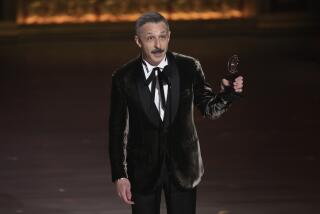STAGE REVIEW : 2 Guys of ‘Greater Tuna’ Expose Foibles of Small and Bigger Towns
- Share via
SAN DIEGO — Ever wonder what happened to Richard Nixon’s Silent Majority--the ones who wanted to help make a better America for the “right” kind of people?
They’re alive and well and living in “Greater Tuna,” a sendup of the third-smallest city in Texas by co-writers and actors Joe Sears and Jaston Williams at the Lyceum Stage through April 2.
The cheerfully self-satisfied residents of Tuna include station OKKK newscasters Thurston Wheelis and Arles Struvie, who couldn’t be prouder of the titles of this year’s winning high school essays: “Human Rights, Why Bother?” and “The Other Side of Bigotry.”
And then there’s Vera Carp, vice president of Smut Snatchers, an organization determined to pull such words as “deflowered” and “nuts” from the dictionary. Remarkably, these three and 17 others--including an unadoptable perennial canine of the week named Yippy--are all played by Sears and Williams.
That the two know their terrain is a given. Both were out-of-work actors in Austin, Tex., when they put this show together seven years ago. Later, Ed Howard came on board as a director and co-writer and “Greater Tuna” has been supporting them ever since.
Part of the “Greater Tuna” success story is obviously the skills of Sears and Williams. Sears uses his beefy frame to take on the slow, solid citizens: the depressed matrons, the cliche-ridden reverend, the menacing sheriff, the insensitive husband, and he reveals surprising emotional depths in most of them. The slightly built Williams buzzes around Sears with a series of children and snappy, waspish and hapless adults, providing more of the stinging side of the comedy.
But part of the success, too, is due to localizing small towns as figures of small-minded fun. The laughter then takes on a spirit of exorcism as clever urban audiences identify the problem as being outside them.
But, before you laugh too much, there is that apt phrase that Vera Carp (Williams), the queen of smut snatchers said to Pearl Burras (Sears), dog poisoner extraordinaire when Pearl criticizes Vera’s boy: “Glass houses . . . “ The sad part is that you don’t have to live in a small town in Texas to champion censorship. You could be a well-to-do matron from a suburb of Detroit like Terry Rakolta, whose protests of “Married . . . With Children” pulled advertising support from the show. Or you could be the leader of Iran.
And when San Diego is a home to Tom Metzger and the Skinheads, how much of a finger can you point at Elmer Watkins (Sears) addressing the Tuna chapter of the KKK?
But the single most remarkable thing Sears and Williams make you do is care even for the very people they are using for target practice. They can actually take would-be book burner, Bertha Bumiller (Sears), and make you squirm when the smart young interviewer (Williams) makes critical mincemeat of her beliefs without her even suspecting.
Yes, Bertha tells the interviewer, she wants to ban “Romeo and Juliet” because it shows a rampant disregard for parental authority and, besides, it encourages teen-age sex.
But doesn’t she know that “Romeo and Juliet” is by William Shakespeare? the young man asks, rolling his eyes.
“Yes,” she says. “And we’re looking into his other works. . . . Didn’t he write ‘Barefoot in the Park?’ ”
But the joke turns sad when the young man leaves leaves smiling, because he has such a good story, and Bertha sighs with relief.
“I’m glad he didn’t ask about my family,” Bertha says.
She’s glad he didn’t ask her about her son in reform school, her husband who runs around on her, or her daughter who believes her life is over because she never made cheerleader.
And, by the time Sears finishes Bertha’s slow, measured, painful account of all the things that have gone wrong for the woman in ways that she doesn’t even understand, one is close to tears for the very same person who seemed such a deserving target of ridicule just a few moments before.
Moments like those save the script from being a one-joke show about Tuna to being a portrait of a people who are not so few and far between as many might like to believe.
“GREATER TUNA”
By Jaston Williams, Joe Sears and Ed Howard. Directed by Ed Howard. Sets by Kevin Rupnik. Costumes by Linda Fisher. Lighting by Judy Rasmuson. Stage manager is Kathy E. Richardson. With Joe Sears and Jaston Williams. At 8 p.m. Tuesday-Friday, 6 p.m. and 9 p.m. Saturday, 3 p.m. and 7 p.m. Sunday, 2 p.m. March 9 and 29. Curtain times are 7 p.m. and 10 p.m. March 31. Closes April 2. At the Lyceum Stage, Horton Plaza.
More to Read
The biggest entertainment stories
Get our big stories about Hollywood, film, television, music, arts, culture and more right in your inbox as soon as they publish.
You may occasionally receive promotional content from the Los Angeles Times.










